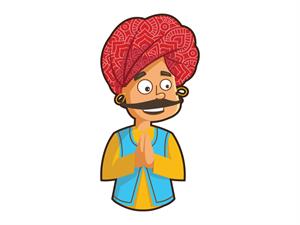
PUMPA - SMART LEARNING
எங்கள் ஆசிரியர்களுடன் 1-ஆன்-1 ஆலோசனை நேரத்தைப் பெறுங்கள். டாப்பர் ஆவதற்கு நாங்கள் பயிற்சி அளிப்போம்
Book Free Demo The king said, “Justice will be done. Don’t worry,” and at once summoned the owner of the house.
“What’s your name?”
“Such and Such, Your Highness.”
“Were you at home when the dead man burgled your house?”
“Yes, My Lord. He broke in and the wall was weak. It fell on him.”
“The accused pleads guilty. Your wall killed this man’s brother. You have murdered a man. We have to punish you.”
When the merchant arrived, the king questioned him.
“What’s your name?”
“Such and Such, Your Highness.”
“Were you at home when the dead man burgled your house?”
“Yes, My Lord. He broke in and the wall was weak. It fell on him.”
“The accused pleads guilty. Your wall killed this man’s brother. You have murdered a man. We have to punish you.”
“Lord,” said the helpless merchant, “I didn’t put up the wall. It’s really the fault of the man who built the wall. He didn’t build it right. You should punish him.”
“Who is that?”
“My Lord, this wall was built in my father’s time. I know the man. He’s an old man now. He lives nearby.”
“Who is that?”
“My Lord, this wall was built in my father’s time. I know the man. He’s an old man now. He lives nearby.”
Explanation:
When the thief’s brother demanded justice, the king told him that justice would be done, and he consoled him. The king was so ignorant that he never realised the thief had died while escaping with the stolen valuables from the merchant’s house. He just believed that the thief died due to the wall collapsing on him, and that was the fault of the house owner who had built a weak wall. So he called out the merchant.
The king inquired about the merchant’s name as soon as he arrived at the palace. The merchant replied, “Such and Such, Your Highness.” Here the narrator did not mention any specific names in the story. For instance, while reading the story, all the characters were called out by being their profession like king, minister, thief, merchant, etc.
The king inquired about the merchant’s name as soon as he arrived at the palace. The merchant replied, “Such and Such, Your Highness.” Here the narrator did not mention any specific names in the story. For instance, while reading the story, all the characters were called out by being their profession like king, minister, thief, merchant, etc.
The king then asked the merchant whether he was at his home when the incident occurred. The merchant replied that at the time of the incident, he was at his home. The merchant further explained the majesty that the burglar made a hole in the wall to enter inside his residence, and when he tried to leave, the fragile wall fell on him. Later, the king stated that the merchant had murdered the thief, and his brother had come to the palace to seek justice. The only way to give justice for the thief’s death was by punishing the merchant.
After hearing the king’s point, the merchant claimed that it was not his fault. The wall was weak because the person who built it did not do so correctly. As a result, punishing him would be beneficial. He went on to say that the wall was built during his father’s time and that the person who made it was now an old man. Also, he stated that he knew the old man very well and he was staying nearby.

The merchant pleaded the king
Meanings of the difficult words:
| S.No | Words | Meanings |
1 | Justice | The system of laws in a country that judges and punishes people |
2 | Summon | To order someone to come to or be present at a particular place, or to officially arrange a meeting of people |
3 | Highness | A title given to a person of royal rank, or used in addressing them |
4 | Burgle | Enter a building illegally with intent to commit a crime, especially theft |
5 | Accuse | To say that someone has done something morally wrong, illegal, or unkind |
6 | Guilty | Responsible for a specified wrongdoing |
7 | Forgiveness | The action or process of forgiving or being forgiven |
8 | Plead | To make an urgent, emotional statement or request for something |
9 | Fragile | Of an object easily broken or damaged |
Reference:
National Council of Educational Research and Training (2006). Moments. In the Kingdom of Fools– A K Ramanujan (pp. 19-24). Published at the Publication Division by the Secretary, National Council of Educational Research and Training, Sri Aurobindo Marg, New Delhi.